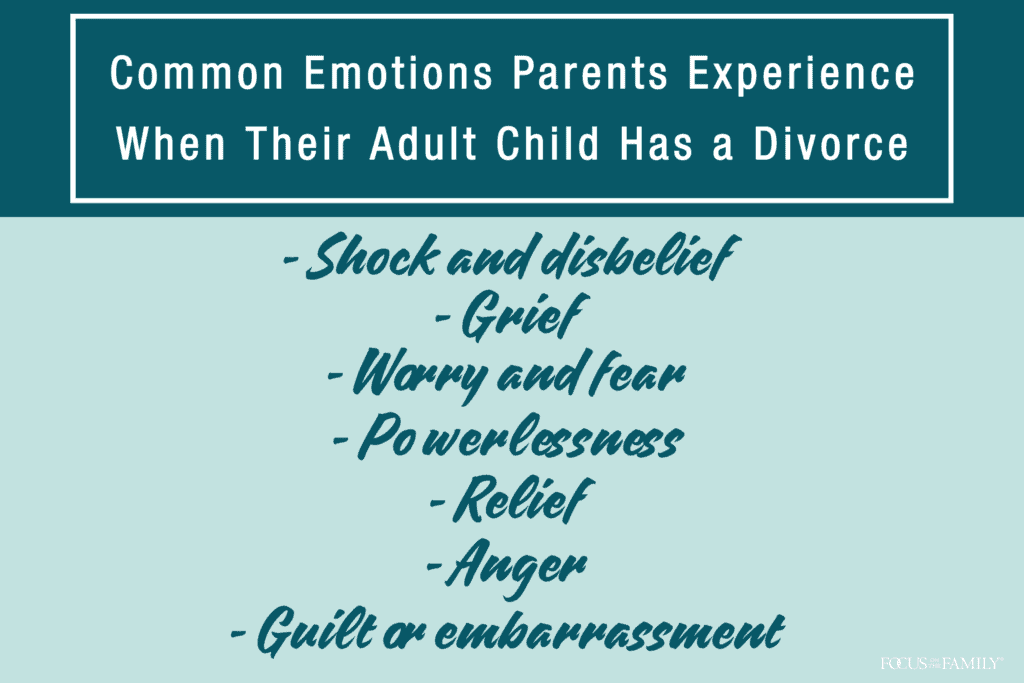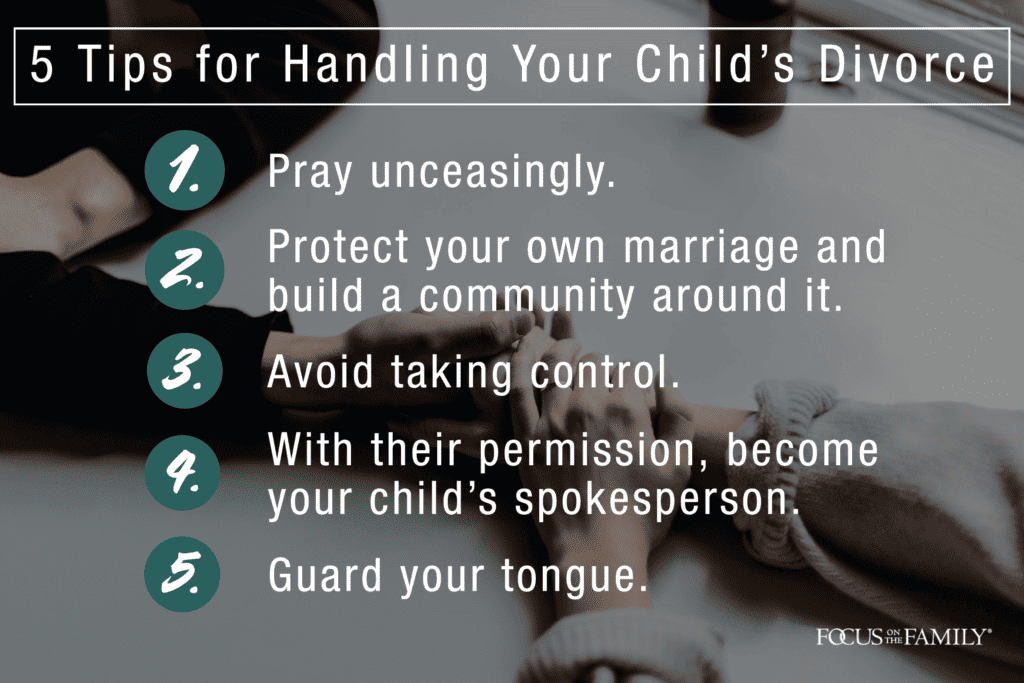It’s hard to describe the pain of walking through your child’s divorce. Here are some ways to deal with the hurt and be a safe place and a firm foundation for them.
Each divorce is the death of a small civilization. — Pat Conroy
“It’s Taylor calling,” Erin said as we walked into a concert hall for our date night. But as she turned her attention back to the phone to talk to our 26-year-old daughter, I could tell something was very, very wrong.
“What?” Erin asked, confused. “Taylor, calm down … I can’t understand you. Why are you crying?”
“Everything OK?” I asked my wife.
“What?!” Erin yelled into the phone. “That’s impossible. You’re joking, right? No way!”
She began to cry as she handed me the phone. My first thought was that someone close to Taylor had died.
“Taylor,” I asked, “Is everything alright?”
It wasn’t. Taylor’s husband had asked her for a divorce.
I was in shock. How could this be happening? This had to be a sick joke. Jeremy* had spent Christmas at our house. He and Taylor had just celebrated their third wedding anniversary. I’d given him my blessing. He promised to love my daughter for a lifetime. And I had walked Taylor down the aisle and placed her hands in his.
Taylor’s phone call wasn’t a joke — the life she had been building with Jeremy had come undone. And it felt like mine had, too.
The impact on parents
Although experts say around 40% of first marriages will end in divorce, I never believed that it would happen to my family. Erin and I are marriage experts, after all. We’re not perfect, but we try to show that with hard work, your marriage can overcome anything. Jeremy had promised me that he’d do anything and everything to get help if he and Taylor experienced problems.
And when those problems happened, Taylor begged Jeremy to get help. She told him that they could go to Hope Restored, one of the best crisis marriage counseling programs on the planet. Erin and I helped start this program years ago with a team of amazing marriage therapists. Nearly 8,000 couples have gone through the Hope Restored intensive program and over 80% of the couples are still together.
But Jeremy wasn’t willing to fight for our daughter.
On Mother’s Day, while our family celebrated at Taylor’s new apartment, Taylor received the final divorce decree. We all wept together.
It’s hard to describe the pain of walking through my daughter’s divorce. But so many other feelings were in play, too. When an adult child is going through a divorce, parents experience a wide range of emotions:
Shock and disbelief
Initially, we thought that our daughter and son-in-law had a good marriage. We knew it wasn’t flawless, but we were blindsided when Jeremy asked for a divorce.
Grief
Divorce is like a death without a funeral. There’s no closure. Divorce feels similar. You grieve the loss of a son- or daughter-in-law. You mourn the lost holidays, dinners and moments together. And much like death, divorce leads to change. Old patterns and habits are swept away to create a “new normal” for those left behind. Your life may get turned upside down. Your retirement plans may change. Perhaps you’ll need to give up some of your free time to support your child and his or her children. You may even have to care for your child or grandchildren in new or unexpected ways.
Worry and fear
After receiving Taylor’s call, we worried about her well-being — emotionally, spiritually, mentally and physically. Would she fall into deep depression? Would she jump into a rebound relationship? How would this impact her relationship with the Lord? As her dad, I’d spent 26 years telling Taylor that she was incredibly valuable — my treasure. In a matter of months, Jeremy had undone what I’d worked so hard to establish. Now Taylor was left wondering why she wasn’t prized enough for Jeremy to fight for her. And since Jeremy had been such a close part of our family, we worried about our other kids. How will this affect their view of marriage and commitment? Will they get the opportunity to tell Jeremy goodbye?
We’re not the only family looking for answers. And those aren’t the only questions families ask.
Many parents and grandparents worry about the children (and grandchildren) of divorce. Other families, however, worry about the fallout from the separation. What will happen to their kids and grandkids? Will grandparents be welcomed in the children’s lives or will the former spouse deny visitation?

Powerlessness
Erin and I fight for marriage. God’s design for marriage is one man and one woman for one lifetime. We believe this. We teach this. However, as we watched Taylor struggle, we felt like helpless victims. The thing we hated most — seeing families torn apart by divorce — was happening to us. And we felt powerless as we watched Taylor and Jeremy’s marriage collapse.
Relief
We love our son-in-law. It hurts to know that he is no longer a part of our family. At the same time, Erin and I felt a bit of relief. Taylor was free from the difficulties that led to the divorce.
You may also find relief (and it’s OK to feel relieved) in knowing that your son or daughter is getting out of a very bad situation or an abusive relationship.
Anger
There were moments I felt so angry at Jeremy because he broke a promise that he’d made — not just to Taylor — but to me. He and I had gone away for an entire weekend and, as he asked for my blessing to marry Taylor, he promised he’d do everything in his power to stay married for life. He made a commitment to me that, if troubles threatened his marriage, he would go to counseling and never give up. And then … he gave up. How could I not be angry?
You may experience a similar anger. Or you may be angry because you’ve watched your child’s spouse do things that broke the marriage — things like abuse, infidelity or addiction. You may feel angry as you watch the divorce turn into a nasty fight over children, property or alimony. Maybe you feel frustrated as custody battles terminate your visitation rights with the grandkids. The anger and pain is real. Erin and I felt it as we watched our daughter and son-in-law argue over the value of a toaster or fight to see who would get the dog — a massive goldendoodle.
Guilt, shame or embarrassment
In the aftermath of Taylor’s call, I tortured myself with the thought that it was partly my fault. How could I have missed the warning signs? Maybe I should never have given him my blessing. We didn’t do enough to prevent the divorce. It’s a common reaction. In her book Your Child’s Divorce, author Marsha Temlock writes that parents often blame themselves. “Perhaps it’s easier to blame yourself than to accept the fact that somehow your children have failed you by not living out your dreams. Many parents cannot accept the humiliation and embarrassment of their children’s divorce.”
And then there’s an even deeper guilt for parents who went through something similar. “I got divorced. I’m responsible for this. I failed to show my kids what a healthy marriage looks like.”
The stress load on your adult child
Experts say that a divorce is usually one of the five most stressful life events. The only thing more painful is the death of a loved one. The stress will cause your child to experience an avalanche of emotions: anger, fear, grief, anxiety, depression. It also takes a physical toll. Many people going through a divorce gain or, more likely, lose weight.
“Parents need to understand that for your child, admitting that their marriage is over is going to be one of the most draining conversations they will have experienced in an already-taxing time in their life,” writes Daniel Pearce for Men’s Divorce. “Your questions and concerns will be addressed but starting off on the supportive and comforting right foot will help you be there for your child in the long run.”
Tips for handling your child’s divorce
The Rock of Gibraltar is more than an enormous cliff formation in Spain at the entrance to the Mediterranean Sea. For centuries, it’s been known for its stability. Choose to be “The Rock” for your children and grandchildren during this difficult season. Provide a safe place and a firm foundation. Here’s how:
Prayer
The only possible way you can consistently show up as “The Rock” is to pray — unceasingly. Ask God to restore the marriage. Pray that He will guard your grandchildren’s hearts and minds as they experience the trauma and pain of divorce. Take comfort in knowing that even if you don’t know what to pray for, Romans 8:26 promises that “the Spirit himself intercedes for us with groanings too deep for words.”
Guard your own marriage
Research shows that divorce is contagious and can actually “spread” among friends. Guard your marriage by maintaining a rock-solid commitment to your spouse, prioritizing time with him or her and then building a community around your marriage. Erin and I did these things and also went to see a marriage therapist as we grieved Taylor’s divorce. I wanted to deal with any issues that might put additional strain on our relationship. I also wanted to show our other children that counseling is normal; it’s what we do to keep our marriage strong.
Encourage reconciliation
We never stopped encouraging Taylor to fight for her marriage. Erin and I prayed for Taylor’s heart to remain open to Jeremy and that Jeremy’s heart would soften. We never gave up hope because sometimes a marriage can survive off of someone else’s hope for a season.
Encourage your child to consider a healing separation instead of a divorce — especially if there has been abuse. (And if that’s the case, both parties will need strong boundaries and significant help.)
Also, encourage your child to receive professional counseling from a licensed Christian counselor. Focus on the Family has a comprehensive referral network of Christian counselors you can search for by ZIP code. Your adult child can also call and speak with one of our Christian counselors at Focus on the Family for free. Taylor found a wonderful counselor who’s been a lifesaver as she’s walked through the divorce.



















 0800 200 362
0800 200 362 support@family.org.nz
support@family.org.nz Rangiora, 7400, New Zealand
Rangiora, 7400, New Zealand